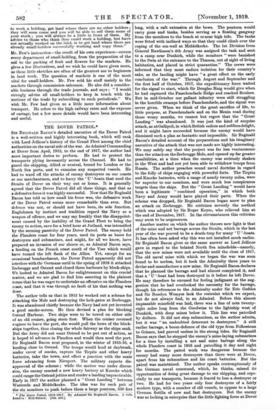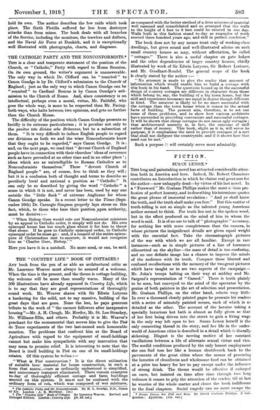THE DOVER PATROL.*
Sin REGINALD BACON'S detailed narrative of the Dover Patrol is a well-written and highly interesting book, which will rank with Lord Jellicoe's history of the Grand Fleet among the chief authorities on the naval side of the war. As Admiral Commanding at Dover from April, 1915, to the end of 1917, the author had most important duties to perform. He had to protect the transports plying incessantly across the Channel. He had to guard the shipping, Allied or neutral, bound for London or the North Sea ports, and to examine any suspected vessels. He had to ward off the attacks of enemy destroyers on our coasts
or our merchantmen, and to harry the '-boats that used the Straits of Dover on their way out or home. It is generally agreed that the Dover Patrol did all these things, and that as a defensive force it was highly successful. Now that Sir Reginald Bacon has told us how small his force was, the defensive work of the Dover Patrol seems more remarkable than ever. But defence was not, or should not have been, its sole function. Englishmen by instinct and tradition regard the Navy as a weapon of offence, and we may say frankly that the disappointment caused by the inability of the Grand Fleet to bring the enemy to action, save for a brief hour at Jutland, was intensified by the seeming passivity of the Dover Patrol. The enemy held the Flanders coast for four years, used its ports as bases for destroyers and submarines, and might, for all we know, have prepared an invasion of our shores or, as Admiral Bacon says, a landing on the French coast south of the Yser which would have turned the left flank of the Allies. Yet, except for an occasional bombardment, the Dover Patrol apparently did not interfere with the Germans until in the spring of 1918 it attacked Zeebrugge and Ostend and closed these harbours by block-ships. We looked to Admiral Bacon for enlightenment on this crucial matter, and we are glad to find him asserting in the plainest terms that he was eager to undertake an offensive on the Flanders coast, and that it was through no fault of his that nothing was done.
The author tells us that in 1915 he worked out a scheme for attacking the Mole and destroying the lock-gates at Zeebrugge. It was abandoned chiefly because the Navy had not yet invented a good smoke-screen. He then devised a plan for blocking Ostend Harbour. Two ships were to be towed on either side of an old cruiser, going stern first. When the cruiser reversed engines to leave the port, she would pull the bows of the blockships together, thus closing the whole fairway as the ships sank. But the Army did not want Ostend to be put out of action, as it hoped t6 advance in Flanders and would then need the port. Sir Reginald Bacon next proposed, in the winter of 1915-16, a landing close to Ostend. The troops would land at daybreak, under cover of smoke, capture the Tirpitz and other heavy batteries, take the town, and effect a junction with the main force advancing from Nieuport. The military experts disapproved of the scheme ; while the matter was under discussion, the enemy erected a new heavy battery at Knocke which could range the Ostend jetties and render a landing impracticable. Early in 1917 the author planned a " Great Landing " between Westende and Middelkerke. The idea was for each pair of the six monitors to push before them a large pontoon, 550 feet
long, with a raft extension at the bows. The pontoon would carry guns and tanks, besides serving as a floating gangway from the monitors to the beach at or near high tide. The tanks were fitted with inclined ways so that they could climb over the coping of the sea-wall at Middelkerke. The 1st Division from General Rawlinson's 4th Army was assigned the task and sent to a camp near Dunkirk, while the monitors " were banished to the Swin at the entrance to the Thames, out of sight of living habitation, and placed in strict quarantine." The crews were informed that they must endure isolation for their country's sake, as the landing might have " a great effect on the early conclusion of the war." Through August and September and the first half of October, 1917, the expeditionary force waited for the signal to start, which Sir Douglas Haig would give when he had captured the Passchendaele Ridge and reached Roulers. But in mid-October our gallant infantry were still struggling in the horrible swamps before Passchendaele, and the signal was never given. When we think of the great sacrifice of life, to little purpose, at Passchendaele and on the Menin road during those weary months, we cannot but regret that the " Great Landing " was abandoned. It was just the kind of surprise attack, as at Gallipoli, in which Britieh sailors and soldiers delight, and it might have succeeded because the enemy would have dismissed such a plan as fantastic and impossible. Sir Reginald Bacon's detailed account of the preparations and his imaginary narrative of the attack that was not made are highly interesting. We may safely say that the project was far less venturesome than the attack on the Zeebrugge Mole, and opened up far greater possibilities, at a time when the enemy was seriously shaken in the West and had not yet been able to withdraw troops from Russia. The author preaches sound naval doctrine in regard to the folly of ships engaging with powerful forts. The Tirpitz and Knocke batteries, with a range of nearly twenty miles, were far superior to our monitors, and were much less conspicuous targets than the ships. But the " Great Landing " would have been a legitimate " combined operation," in which both Navy and Army would have played their parts. When the scheme was dropped, Sir Reginald Bacon began anew to plan an attack on Zeebrugge. He criticizes severely the method which was adopted by Sir Roger Keyes, who relieved him at the end of December, 1917. In the circumstances this criticism may seem to be ungenerous.
Another matter on which the author throws new light is that of the mine and net barrage across the Straits, which in the last year of the war proved to be a death-trap for many ' II '-boats. It has often been asked why this was not installed much earlier. Sir Reginald Bacon gives us the same answer as Lord Jellicoe gave in regard to the belated North Sea minefields—namely, that the new mines were not available until the close of 1917. The old naval mine with which we began the war was soon found to be useless, but it took the Admiralty three years to devise and manufacture a new mine. Sir Reginald Bacon declares that he planned the barrage and had almost completed it, and that a ' U'-boat had been destroyed in it before he left Dover. He may therefore be excused for feeling indignant at the suggestion that he had overlooked the necessity for the barrage, though his references to the Admiralty under Sir Eric Geddes and Sir Rosalyn Wemyss lack the restraint which we expect, but do not always find, in an Admiral. Before this almost impassable minefield was laid, there was a line of nets twentyeight miles long from the Goodwins to the lightship west of Dunkirk, with deep mines below it. This line was patrolled by drifters. It did not stop submarines, as the author admits, but it was " an undoubted deterrent to destroyers." A still earlier barrage, a boom-defence of the old type from Folkestone to Grisnez, had proved useless in the strong tides. Sir Reginald. Bacon says that he stopped the enemy's mine-laying submarines for a time by installing a net and mine batrage along the whole Flanders coast in 1916 and patrolling it day and night for months. The patrol work was dangerous because the enemy had many more destroyers than there were at Dover, apart from his submarines and his coast batteries. But the patrol was maintained. The author speaks contemptuously of the German naval command, which, he thinks, missed its opportunities of doing great damage to our shipping, and especially to our transports, because it feared to lose a destroyer or two. He had for two years only four destroyers of a fairly modern type, with a number of old vessels, to oppose to a large German flotilla of new and fast destroyers. But the enemy was so lacking in enterprise that the little fighting force at Dover
held its own. The author describes the few raids which took place. The Sixth Flotilla suffered far less from destroyer attacks than from mines. The book deals with all branches of the Service, including the monitors, the trawlers and drifters, and the Naval Air Force at Dunkirk, and it is exceptionally well illustrated with photographs, charts, and diagrams.
THE CATHOLIC PARTY AND THE NONCONFORMISTS.* Tars is a clear and temperate statement of the position of the Church, or " Catholic," Party with regard to Home Reunion. On its own ground, the writer's argument is unanswerable.
The only way in which Dr. Clifford can be " reunited " to Canon Goudge is by Dr. Clifford's submission to the Church' of England ; just as the only way in which Canon Goudge can be " reunited " to Cardinal Bourne is by Canon Goudge's sub mission to the Church of Rome. And, since consistency is an intellectual, perhaps even a moral, virtue, Mr. Faithful, who goes the whole way, is more to be respected than Mr. Facingboth-ways, who halts between two opinions, and gets no further than the Church House.
The difficulty of the position which Canon Goudge presents so lucidly is its extreme particularism ; it is peculiar not only to the penitus tote divisos orbe Britannos, but to a subsection of them. " It is very difficult to induce English people to regard
our divisions as both we and the wiser Nonconformists know that they ought to be regarded," says Canon Goudge. It is : and, on the next page, we read that " devout Church of England people have in connection with their churches ideas of reverence such as have prevailed at no other time and in no other place ' ; ideas which are as unintelligible to Roman Catholics as to Nonconformists themselves." These " devout Church of England people " are, of course, free to think as they will ; but it is a confusion both of thought and terms to describe so peculiarly local and national a position as " Catholic." It can only be so described by giving the word " Catholic " a sense in which it is not, and never has been, used by any one
outside the " little flock " of extreme Anglicans for whom Canon Goudge speaks. In a recent letter to the Times (Sept
ember 10th) Dr. Carnegie Simpson properly lays stress on this fact, which, to those who base their position upon authority, must be decisive :
"When Bishop Gore would rule out Nonconformist ministers by an appeal to Catholic order, it simply will not do. His own episcopal house has too much glass about it for him to throw that stone. If he goes to Catholic episcopal order, to Catholic episcopal order he must go : and, if a council of the entire episcopate of Christendom met to-morrow, it would not recognize him as Charles Gore, Bishop.' "







































 Previous page
Previous page